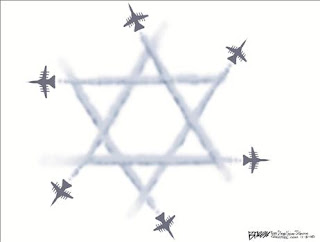'Reach out ...!'
"...An end must be put to Bashar's regime, and an end being in sight in one way or another, it has already affected other regional players, both near and far from Damascus. The Tehran-Damascus-Hezbollah- Hamas axis has been a potent source of danger to the stability of the entire Middle East. The ongoing weapon supply chain from Tehran via Damascus, to Lebanese and Palestinian terror organizations, was the foundation for this dangerous coalition. Now, the alarm bells are sounding in Tehran's mosques, and in Beirut's headquarters.Khaled Mashaal and Hamas were the first to understand the strategic shift, and he and his cronies fled Damascus and are now looking for refuge in Amman or Doha. Hassan Nasrallah of Hezbollah is Assad's last remaining supporter, besides his Iranian godfathers, weaving conspiracy theories around the bloodshed in Syria, as Nasrallah knows that his position as the de facto ruler of Lebanon may be damaged. Even the Muslim Brotherhood organizations in Cairo and the Maghreb have stood up against the Alawite "kingdom," as was apparent in the recent "Friends of Syria" summit in Tunis.This further deepens the divide between relatively moderate and fundamentalist Islam, placing the relatively more moderate, mainly Sunni, mainstream Islamists, opposite the dogmatic Shia made-in-Tehran version, which is all the while trying to export a fundamentalist ideology of the supremacy of Shari'a law and fanatic hate for the infidels, be they Arab or Western.The supreme leader, Ali Khamenei, and President Mahmoud Ahmadinejad have already brutally suppressed the "Green Revolution" in Tehran, and when it comes to brutality and fanaticism, they can teach even Bashar Assad a lesson. The Iranian regime combines fundamentalist Islam with militant warfare capacities - from a vast terror network, to the ongoing effort to produce nuclear weapons. They thrive on an ideology of hate, denying the Holocaust and Israel's right to exist, and seeing in the United States "the Great Satan."They are also a tragedy to the Iranian people, to the continuum of the great Persian culture and civilization.But even Tehran is concerned with the possibility of a regime change in Damascus, and with the crippling sanctions that affect the economy of Syria, an already very poor country.The Tehran-Damascus-Beirut axis is thus in flux, and it is therefore critical how the world, led by the West and the United States, will act in relation to Assad's atrocities and Ahmadinejad's ambitions. From a moral and strategic point of view, the West and the United States cannot stand idly by, and have to move from words to deeds, in order to topple the Damascus tyrant.Sanctions can not suffice. While a Security Council resolution is impossible, NATO, led by the United States, should initially declare a no-fly zone over Syria, arm the rebels and organize the opposition, as it has already begun to do in Tunis, with the Syrian National Council. In the second stage, the involvement of NATO's air forces in order to defeat Bashar's army should not be ruled out, nor should peacekeeping functions be ruled out in the aftermath. Some, even in Israel, are wary of such engagement, as they fear what and who will succeed Assad.Such actions would be the beginning of the end of the Assad regime in Syria.This would lead to a shift in the balance of forces, with Iran and Hezbollah weakened..."

No comments:
Post a Comment